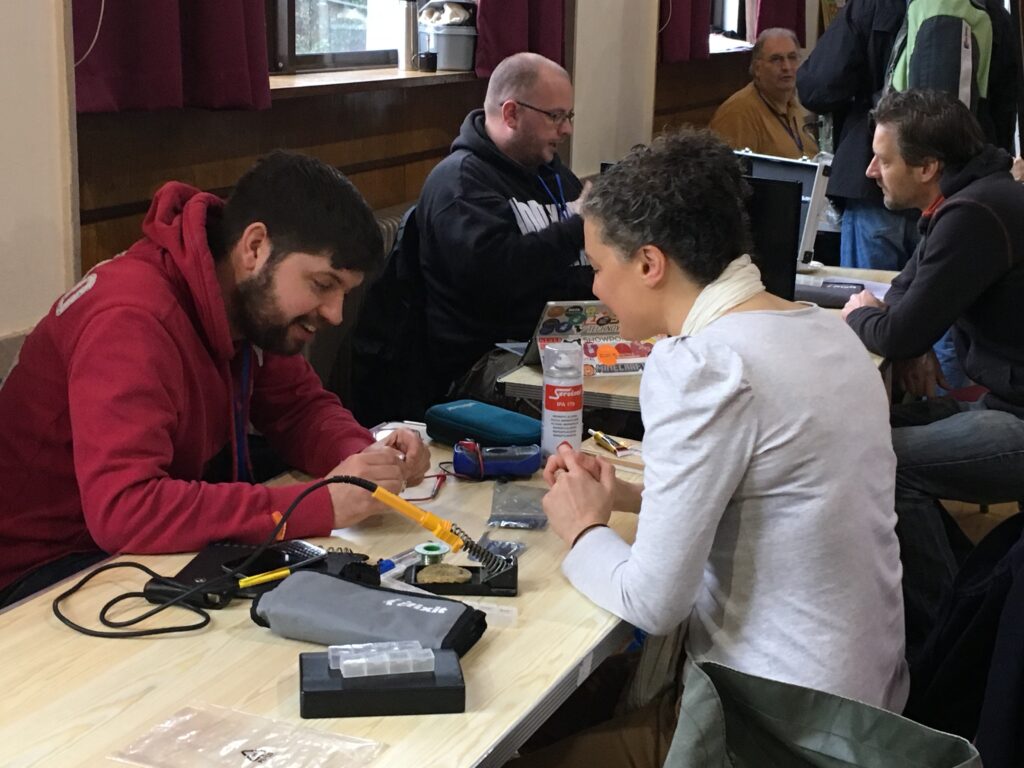International Repair Day is being celebrated today (19th October 2024) and we’re celebrating a global movement championing sustainability and advocating for the Right to Repair. This year is particularly special as we mark 15 years since the very first Repair Café was launched in 2009, in the Netherlands. Since then, Repair Cafés have blossomed into a worldwide movement, with thousands of communities coming together to repair broken items, share skills, and reduce waste. Mirella Ferraz explains.
______________________________________________________________________________________________________
This year’s celebration of International Repair Day is not just a moment to reflect on the past, but also to recognise the connection between Repair Cafés and Libraries of Things, like our Share Shed, and their broader benefits for wellbeing. The act of repairing and sharing not only saves resources and reduces waste, but also fosters a sense of community, enhances skills, and promotes mental and emotional wellbeing by connecting people through meaningful, hands-on activities. It empowers people to make their lives better, supporting their sense of agency.
The History of Repair Cafés
When Martine Postma founded the first Repair Café in Amsterdam in 2009, she likely had no idea how widespread the movement would become. Today, thousands of volunteers across the world participate in Repair Cafés and other community repair events like Restart Parties, helping to restore everything from household appliances to clothing, tools, toys and bicycles. The power of this movement lies in its simplicity: people gathering to fix things and prevent them from ending up in landfills.
To date, the Open Repair Alliance – an international collaboration of repair networks – has collected data from 19,986 events across 31 countries, logging an incredible 208,491 repair attempts. But these numbers are only the tip of the iceberg. It’s estimated that over 4,000 groups are currently active globally, performing around 190,000 successful repairs annually.
The Rise of Community Repair: A New Report by The Restart Project
In conjunction with International Repair Day and the Open Repair Alliance, The Restart Project has released a landmark report titled “The Rise of Community Repair: The People and the Data Creating a Movement.” This report highlights the scale of the community repair movement and the incredible impact it is having worldwide.
The data reveals that over the last 15 years, 53% of products brought to community repair events have been successfully repaired. However, the report also exposes the barriers faced by repairers: 25% of repair attempts fail due to the lack of available or affordable spare parts, poor product design, or the absence of repair information. This underscores the urgency for stronger, worldwide, Right to Repair legislation and better product support from manufacturers.
The data also shows that most of the products seen at repair events have a lifespan much longer than the industry would have us believe. For example, the average lifespan of mobile phones is less than 5 years, while power tools and hair dryers have an average life of 10 years. Some older products, like Hi-Fi integrated systems, last up to 18 years, and projectors can last an impressive 28 years.
These insights highlight the critical role of Repair Cafés and community repair in promoting a sustainable, circular economy and reducing waste. As the movement continues to grow, it also points to a promising future where Repair Cafés could become more permanent fixtures in high street locations, fostering a robust repair economy.

Repair Cafés and Libraries of Things: A Shared Vision for Sustainability and Wellbeing
Repair Cafés are not only about fixing items; they play a vital role in sharing skills, building community resilience, and promoting environmental responsibility. Their ethos aligns closely with that of Libraries of Things, which enable people to borrow, rather than buy, items like tools and appliances, that they only need to use occasionally.
At the Network of Wellbeing, we believe in the power of repair and reuse. That’s why we’re excited to announce our role in supporting the rebirth of the Dartington Repair Café and the launch of the Buckfastleigh Repair Café, both in Devon, UK. These new initiatives will provide local residents with the opportunity to repair items, save money, and reduce their environmental impact.
- The Dartington Repair Café will relaunch on 2nd November from 1pm to 4pm, at Things Happen Here.
- The Buckfastleigh Repair Café will have its very first event on 16th November from 10am to 12:30pm, at the Moor Imagination Centre.
Both events are free to attend, and while donations to cover the running costs are always welcome, the primary goal is to bring the community together to fix, reuse, and share knowledge.
We’re actively looking for volunteer repairers to support these events. If you’re interested in lending your skills, or simply helping out, please get in touch at
If you want to find out your nearest Repair Café, see here.
Moving Towards a Greener Future
The movement for a Right to Repair is gaining momentum worldwide, and the impact of community repair groups like Repair Cafés cannot be underestimated. Together, we can tackle the growing waste crisis, fight for better legislation, and cultivate communities where repair and reuse are the norm.
If we want a greener, more sustainable future, we must all take action to reduce waste, support repair, and embrace a circular economy. Let’s make this International Repair Day a celebration of our power to fix, mend, and repair—not just our belongings, but our relationship with the planet.

